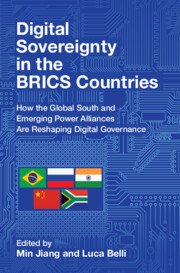
-
Select format
-
- Publisher:
- Cambridge University Press
- Publication date:
- 31 December 2024
- 02 January 2025
- ISBN:
- 9781009531085
- 9781009531139
- 9781009531122
- Creative Commons:
-
This content is Open Access and distributed under the terms of the Creative Commons Attribution licence CC-BY-NC 4.0.
https://creativecommons.org/creativelicenses - Dimensions:
- (229 x 152 mm)
- Weight & Pages:
- 0.566kg, 314 Pages
- Dimensions:
- (229 x 152 mm)
- Weight & Pages:
- 0.471kg, 314 Pages
Open AccessYou have digital access to this book
Book description
In a world where digital development and policymaking are dominated by Silicon Valley tech giants, the BRICS countries - Brazil, Russia, India, China, and South Africa - play an increasingly important role. With forty percent of the world's population and twenty-five percent of global GDP, these nations possess vast troves of personal data. Yet, their conceptions, narratives, and initiatives of digital sovereignty remain understudied. This volume is the first to explore digital sovereignty from a Global South perspective and offers a forward-looking take on what a world less dependent on Silicon Valley might look like. It brings together excellent analyses of BRICS digital sovereignty issues, from historical imaginaries to up-to-date conceptualizations, e-payment to smart cities, legal analysis to geopolitical assessment. By offering neglected perspectives from the Global South, this book makes important contributions to the digital sovereignty debate. This title is also available as Open Access on Cambridge Core.
Contents
Full book PDF-
Digital Sovereignty in the BRICS Countries
pp i-i -
-
- You have access
- Open access
- HTML
- Export citation
-
-
Communication, Society and Politics - Series page
pp ii-iv -
-
- You have access
- Open access
- HTML
- Export citation
-
-
Copyright page
pp vi-vi -
-
- You have access
- Open access
- HTML
- Export citation
-
-
Contents
pp vii-viii -
-
- You have access
- Open access
- HTML
- Export citation
-
-
Figures
pp ix-x -
-
- You have access
- Open access
- HTML
- Export citation
-
-
Tables
pp xi-xii -
-
- You have access
- Open access
- HTML
- Export citation
-
-
Contributors
pp xiii-xviii -
-
- You have access
- Open access
- HTML
- Export citation
-
-
Preface
pp xix-xxiv -
-
- You have access
- Open access
- HTML
- Export citation
-
-
Acknowledgments
pp xxv-xxvi -
-
- You have access
- Open access
- HTML
- Export citation
-
-
Special Acknowledgments: Institutional Sponsors for Open Access
pp xxvii-xxviii -
-
- You have access
- Open access
- HTML
- Export citation
-
-
Abbreviations
pp xxix-xxx -
-
- You have access
- Open access
- HTML
- Export citation
-
-
1 - Introduction
pp 1-38 - Contesting Digital Sovereignty: Untangling a Complex and Multifaceted Concept
-
-
-
- You have access
- Open access
- HTML
- Export citation
-
-
Part I - State-centric Formations of Digital Sovereignty
pp 39-102 -
-
- You have access
- Open access
- HTML
- Export citation
-
-
2 - Digital Sovereignty in China, Russia, and India
pp 41-62 - From NWICO to SCO and BRICS
-
-
-
- You have access
- Open access
- HTML
- Export citation
-
-
3 - The Spatial Expansion of China’s Digital Sovereignty
pp 63-80 - Extraterritoriality and Geopolitics
-
-
-
- You have access
- Open access
- HTML
- Export citation
-
-
4 - South African Digital Sovereignty at the Crossroad of Securitization and Development
pp 81-102 -
-
-
- You have access
- Open access
- HTML
- Export citation
-
-
Part II - Techno-economic Structurings of Digital Sovereignty
pp 103-164 -
-
- You have access
- Open access
- HTML
- Export citation
-
-
5 - Digital Sovereignty and Payments
pp 105-123 - A Case Study of the National Payments Corporation of India
-
-
-
- You have access
- Open access
- HTML
- Export citation
-
-
Part III - Grassroots Contestations of Digital Sovereignty
pp 165-238 -
-
- You have access
- Open access
- HTML
- Export citation
-
-
References
pp 239-274 -
-
- You have access
- Open access
- HTML
- Export citation
-
-
Index
pp 275-282 -
-
- You have access
- Open access
- HTML
- Export citation
-
Metrics
Altmetric attention score
Full text views
Full text views help Loading metrics...
Loading metrics...
* Views captured on Cambridge Core between #date#. This data will be updated every 24 hours.
Usage data cannot currently be displayed.
Accessibility standard: Unknown
Why this information is here
This section outlines the accessibility features of this content - including support for screen readers, full keyboard navigation and high-contrast display options. This may not be relevant for you.
Accessibility Information
Accessibility compliance for the PDF of this book is currently unknown and may be updated in the future.


